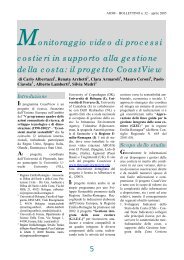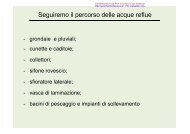The 21st Century climate challenge
The 21st Century climate challenge
The 21st Century climate challenge
Create successful ePaper yourself
Turn your PDF publications into a flip-book with our unique Google optimized e-Paper software.
ationale for investment in risk insurancethrough mitigation.• Near-term human development reversals.Long before catastrophic events due to<strong>climate</strong> change impact on humanity, manymillions of people will be profoundlyaffected. It might be possible to protectAmsterdam, Copenhagen and Manhattanfrom rising sea levels in the 21 st <strong>Century</strong>,albeit at high cost. But coastal flood defenceswill not save the livelihoods or the homesof hundreds of millions of people living inBangladesh and Viet Nam or the Niger orNile deltas. Urgent <strong>climate</strong> change mitigationwould reduce the risks of human developmentsetbacks over the course of the 21 st <strong>Century</strong>,though most of the benefits will occur after2030. Reducing human costs prior to thatdate will require support for adaptation.Social justice and ecologicalinterdependence<strong>The</strong>re are many theories of social justice andapproaches to efficiency that can be broughtto bear on <strong>climate</strong> change debates. Perhaps themost apposite was crafted by the Enlightenmentphilosopher and economist Adam Smith. Inconsidering how to determine a just and ethicalcourse of action, he suggested a simple test:“to examine our own conduct as we imagineany other fair and impartial spectator wouldexamine it”. 80Such a “fair and impartial spectator” wouldtake a dim view of a generation that failed to acton <strong>climate</strong> change. Exposing future generationsto potentially catastrophic risks might be consideredinconsistent with a commitment to corehuman values. Article Three of the Universal1<strong>The</strong> 21 st <strong>Century</strong> <strong>climate</strong> <strong>challenge</strong>Special contributionOur common future and <strong>climate</strong> changeSustainable development is about meeting the needs of presentgenerations without compromising the ability of future generationsto meet their own needs. More than that, it is about social justice,equity and respect for the human rights of future generations.Two decades have now passed since I had the privilege ofchairing the World Commission on the Environment. <strong>The</strong> Reportthat emerged from our proceeding had a simple message that wascaptured in its title, Our Common Future. We argued that humanitywas overstepping the limits of sustainability and running down theworld’s ecological assets in a way that would compromise the wellbeingof future generations. It was also clear that the vast majorityof the world’s population only had a small share in the overuse ofour finite resources. Unequal opportunities and unequal distributionwere at the heart of the problems we identified.Today we need to refl ect in detail on <strong>climate</strong> change. But isthere any more powerful demonstration of what it means to liveunsustainably?<strong>The</strong> Human Development Report 2007/2008 sets out what itdescribes as a ‘carbon budget’ for the 21 st <strong>Century</strong>. Drawing uponthe best <strong>climate</strong> science, that budget establishes the volume ofgreenhouse gases that can be emitted without causing dangerous<strong>climate</strong> change. If we continue on our current emissions trajectory,the carbon budget for the 21 st <strong>Century</strong> will expire in the 2030s. Ourenergy consumption patterns are running up vast ecological debtsthat will be inherited by future generations—debts that they will beunable to repay.Climate change is an unprecedented threat. Most immediately,it is a threat to the world’s poorest and most vulnerable people:they are already living with the consequences of global warming.In our already deeply divided world, global warming is magnifyingdisparities between rich and poor, denying people an opportunityto improve their lives. Looking to the future, <strong>climate</strong> change posesrisks of an ecological catastrophe.We owe it to the world’s poor and to future generations toact with resolve and urgency to stop dangerous <strong>climate</strong> change.<strong>The</strong> good news is that it is not too late. <strong>The</strong>re is still a windowof opportunity, but let’s be clear: the clock is ticking, and time isrunning out.Rich nations must show leadership and acknowledge theirhistoric responsibility. <strong>The</strong>ir citizens leave the biggest carbonfootprint in the Earth’s atmosphere. Moreover, they have the financialand technological capabilities needed to make deep and early cuts incarbon emissions. None of this means that mitigation has to be left tothe rich world. Indeed, one of the most urgent priorities is internationalcooperation on technology transfer to enable developing countriesto make the transition to low-carbon energy systems.Today, <strong>climate</strong> change is teaching us the hard way some ofthe lessons that we attempted to communicate in Our CommonFuture. Sustainability is not an abstract idea. It is about finding abalance between people and planet—a balance that addresses thegreat <strong>challenge</strong>s of poverty today, while protecting the interests offuture generations.Gro Harlem BrundtlandChair of the World Commission on Sustainable DevelopmentFormer Prime Minister of NorwayHUMAN DEVELOPMENT REPORT 2007/2008 59




